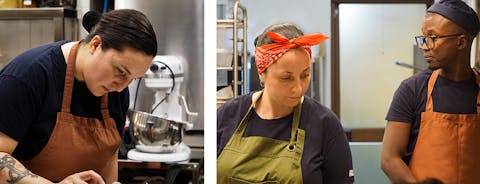Teresa Galanti: the chef who tells her vision of the sea with Aurea | Olianas
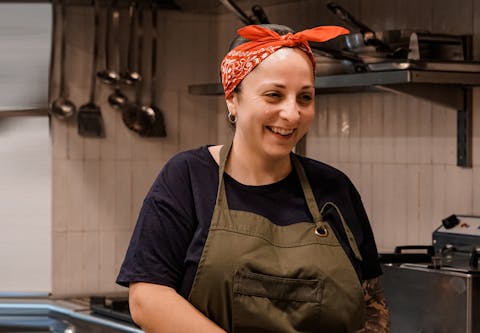
People
Teresa Galanti: the chef who tells her vision of the sea with Aurea
by Jessica Cani
The sea has always been a voice that Teresa Galanti listened to. Born in Castelsardo into a family of fishermen and raised by her grandparents among jars of tomato preserves and salted small fish, she quickly learned that giving is a natural gesture.
Today, she does it through food.
“I’m not a very physical person, but cooking is my way of loving. That’s how I was raised: if you came to my grandmother’s house, you never left without a piece of good cheese or a bottle of our homemade olive oil.”
In May 2025, in Cagliari, Aurea opens, a project shared with Luna Püz Olivares – pastry chef and life partner – from Chile, living in Sardinia for ten years. Six seats at the counter, a constantly changing menu, a tasting experience that is more storytelling than a menu. This is Aurea: a place where Teresa cooks to give back.
“Cooking is my refuge, my cerebral balance point. It’s where I find serenity. If I stop creating, I lose myself.”
The name Aurea was born one sleepless night after watching a film about Caravaggio. Teresa thought of Fibonacci’s golden ratio, the natural and imperfect beauty that repeats in cabbages, nautiluses, and waves.
“Everything I love is there: in the spontaneous balance of things. In a spiral. In a shell. In a design that is never forced.”
Aurea sounds feminine, yet it also embodies a vision. The subtitle, “contemporary osteria,” tells the other side of Teresa: the popular, direct, lively side.
“For me, the chef must return to being an innkeeper. There’s no uniform anymore: it’s about hospitality. It’s like your grandmother’s best living room, where you sit down and are fed generously.”
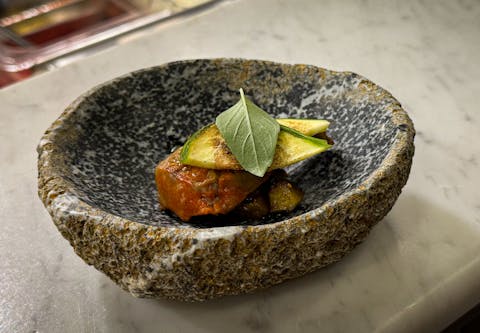
Cooking entered Teresa Galanti’s life quietly, and it never left. She was still a teenager when she started helping in a restaurant with the harsh discipline of the old school: endless shifts, strict rules, few smiles.
“I cleaned the fish, watched the chefs. I was mesmerized. And at some point I thought: I can do this. I mean, what they are doing… I can do it too.”
In reality, she was studying something entirely different. She dreamed of becoming a comic book artist and even had a few small openings in that world. Yet, cooking kept calling her. When a colleague offered her some extra work during the winter, she accepted.
The following season, it was her brother who suggested an opportunity: he was working as a bartender in Porto Cervo and told her, “There’s a dishwasher position.” Teresa declined. Not out of arrogance, but out of awareness. “I felt I could give more.”
She talked to the head chef of the place. He observed her and said, “I think you’ll become a great chef. You do things that even chefs with years of experience don’t do. You design dishes, deconstruct them, take notes. You’re curious. And curiosity can’t be taught.”
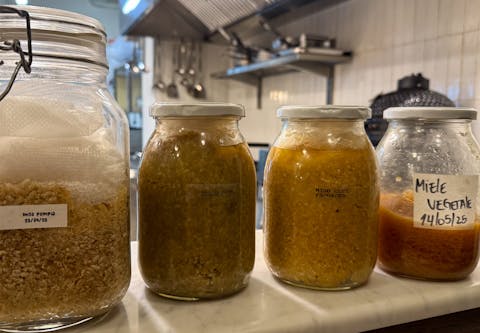
Then, the unexpected happens: the chef has a family emergency and asks her to cover for him. “I locked myself in the kitchen. I studied. I did my part. If it went wrong, so be it. But at least I had tried.” She was just over nineteen. Yet, she managed service in one of the most famous restaurants on the Costa Smeralda. The chef didn’t return, and the owners decided to put her in charge of the kitchen.
From that moment, she never looked back.
“I realized that cooking was what I was truly searching for. I will always love art, but in the kitchen I feel alive. When I cook, I enter an almost hermetic state. In that dish, in that gesture, I find peace.”
But her work is not just about memory and technique. It’s vision. It’s creative tension.
A rock spirit that, since 2013, has chosen to express itself also through plant-based cuisine.
“Since I became vegetarian, vegetables have become an essential part of my identity. It’s not a sacrifice, it’s a blank canvas. Where others see limits, I see an explosion of possibilities.”
In her dishes, there is no concept of “alternative.” No sad salad for those who don’t eat meat. “I find it unacceptable that a guest with ethical choices should feel less considered at the table. Cooking is culture. And culture means knowing what is beneath our feet—or under the sea.”
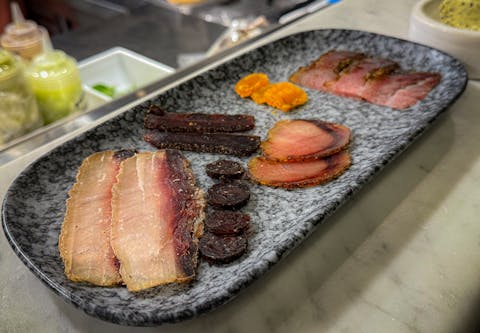
For Teresa, the sea is a living root, a liquid land, an umbilical cord that keeps her tied to the island. “For me, the sea is family, inspiration, gratitude. The sea shaped me, nourished me, raised me.”
A mother who captained a boat, a father who was a sailor: two lives spent on the water, between ports, seasons, and sacrifices, which brought Teresa closer to cooking thanks to her grandmother’s teachings. “I cooked as a child to make my parents happy. They came home tired, and I wanted them to find something good.”
At the Galanti household, cooking was not just nourishment: it was caring for time and for the world. Grandma Antonietta cooked for the family and the neighbors, while Grandpa Gavino returned with hands marked by salt and countless stories to share with his granddaughter. “They taught me to give, always. I am the sum of their emotions.”
In that home, integral sustainability was practiced. They gathered what the fields offered, stored what the sea provided. “What was there went onto the plate. No rhetoric, no labels. It was simply our way of life, because it was common sense. Today we call it sustainability, but for me, it is a way of being, not a trend. I hear the word everywhere, but often it’s just a label. For me, it’s DNA. I cannot cook an ingredient if it’s not its season, and my menu changes constantly because I myself am change.”
That culture of time, matter, and limits remains the backbone of her work today. She absorbed it from the stories of her sailor grandfather, romantic and full of care, who taught her respect for the sea. And from a family of fishermen who, even in the simplicity of their work, already sought to preserve, not to waste, not to overexploit.
“Living life passionately was transmitted to me by them. My grandfather’s poetry, Antonietta’s love for cooking, the sense of duty and beauty they left me.” The sea always returns—in her dishes, her memories, her gestures. “Cooking the sea is like cooking myself. It is gratitude, it is identity.”
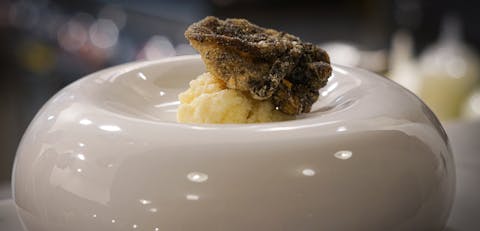
Teresa strikes with the harmonious duality in the way she tells her story: she has the calm gait of someone reserved, yet the steady voice of someone who knows exactly where she comes from. There is pride in her words, but never self-indulgence. She speaks of her story with genuine pride. She knows herself deeply, and it shows — what she does is above all a choice of identity. Yet she shares all of this with simplicity, with the humility of someone who has breathed both labor and love since childhood, sitting in the kitchen beside her grandparents while the world outside was made of salt, wind, and waiting. Listening to her, I tell her that her story reminds me a little of my own: hers smells of salt, mine of earth.
For Teresa, the sea is territory. It is Northern Sardinia, it is family, it is childhood. It is the low chair next to her grandparents for salting anchovies. It is the moray, “the little pig of the sea,” which meant conviviality and beauty. It is the memory of lentils stewed with lobster on a boat stove, cooked by Greek fishermen who were family friends.
For her, cooking is contamination, born from a childhood spent among bridges, ports, and Mediterranean dialects. In her home, Greeks, Amalfitans, Sicilians sat together: they spoke the language of the sea, exchanged gestures and recipes. She grew up in a family that navigated and welcomed, that cooked with what was at hand and with whoever was present.
It is also for this reason that she firmly rejects the image of a gastronomically flattened Sardinia. The sea, if you truly know it, is an open horizon. “It makes me angry when they tell me that tourists want suckling pig or malloreddus. No, that’s what we’ve decided to serve them because it’s easier. Because cleaning a spiny fish takes more time and care.”
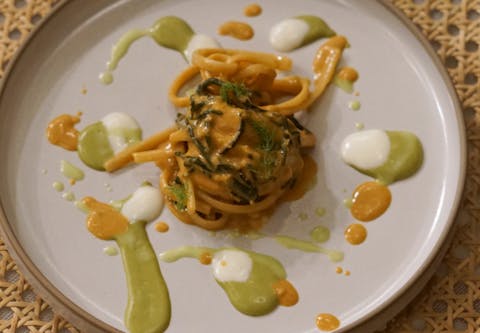
Aurea is a welcoming and straightforward place, where one can stop for lunch or dinner, choosing from the menu or entrusting oneself to the surprise tasting. I opted for the free-hand tasting, which Teresa changes often, following the seasons and the inspiration of the moment. Among the dishes, there is yellowtail roe with roasted lemon and fennel oil, soft and profound, or a crispy moray eel chip, almost to be bitten like crackling. Equally extraordinary is the fried monkfish, placed on a tomato prepared with garlic, acidulated with caper vinegar, and accompanied by a lacto-fermented tomato that amplifies its marine echo.
One of Teresa’s signature dishes is Marè: spaghetti cooked in a sea essence (extraction of rocky flora and fauna), with citrusy samphire and peretta of Perfugas. No salt, only natural savoriness and balanced contrasts.
The dessert did not disappoint. I love endings, and I knew that Luna Püz Olivares is one of the brightest minds in the regional culinary scene. Her dessert with chicory and carob – featuring chicory coffee, caramel, mascarpone – tells a story of a time when carob was the “cocoa of the poor.” A humble, sustainable, and rooted ingredient.
Galanti and Püz Olivares carry forward their small revolution with a clear and determined vision. Every dish is an act of resistance, a gesture of coherence. “Sometimes they tell me I’m out of fashion. That’s fine. I prefer to be a vintage chef,” Teresa says, smiling.
In the dining room, Rachele and Francesca contribute to the experience, while in the kitchen Guido helps give shape to a project that is fresh, urgent, and necessary. A cuisine that does not settle for being merely good, but one that wants to make us think.
